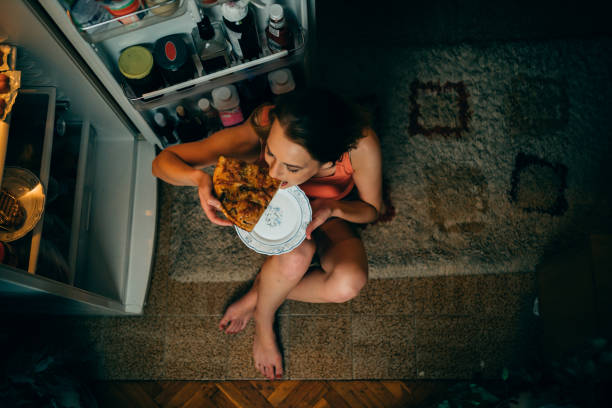Knowledge is power when dealing with any illness.
Here is a great piece of knowledge that is commonly ignored or not talked about when healing:
DON'T EAT LATE
This one might sound strange or ridiculous, but bear with me.

It may sound like a tall tale, but let's look into why this matters and why it could be the reason your body isn't healing.
WHAT DOES EATING LATE DO TO YOUR BODY?

Eating late disrupts the digestive system. When the digestive system is disrupted, there isn't enough time to digest and rest properly for optimal health and healing. Because the gut is responsible for a large portion of the immune system, keeping it at peak performance is critical for patients with chronic illnesses.
| When I first became ill, I would eat until 2 a.m. to comfort myself and could not sleep until 3 or 4 a.m. I would wake up soaked in sweat a few hours later.
I had no idea the liver worked its hardest between 11 p.m. and 3 a.m. My body had to drench me in sweat to rid itself of the thousands of toxins that were causing my chronic illness because I was not allowing my liver to do its job between the appropriate hours it did its work). Once I learned how important sleep was for repair and started eating according to the time, the night sweats stopped. |
THE SCIENCE BEHIND THE GUT SYSTEM

By understanding how the gut works and what can go wrong, you can learn why keeping it in a productive state is necessary for healing.
HOW IT WORKS
- In this process, amylase (an enzyme) is produced in the mouth to break down starchy foods that head down to the stomach. In the stomach, two enzymes, pepsin (which begins protein digestion) and gastric lipase (which begins fat digestion), are churned. Hydrochloric acid (HCI) helps to keep a low pH to signal the body to actively digest correctly and destroy harmful pathogens.
*Low HCI is becoming more common and has been contributing to the skyrocketing gut issues we have been seeing.
- Food then travels to the intestines, where it is broken down by digestive enzymes and fluids from the liver (bile released from the gallbladder aids in fat digestion) and pancreas (pancreatin breaks down fats, proteins, and carbs) for maximum absorption.
- The next place food travels is the ileum and then the jejunum (other areas of the small intestine).
- Once food is fairly broken down, it travels to the colon (an anaerobic environment with little to no oxygen present). This lack of oxygen is great for your bacteria (microorganisms) to thrive. Their job is to further ferment (break down) food to absorb more nutrients.
- Water is reabsorbed to be used by the body.
- What is not absorbed during this process is then moved to the end of the colon and exits the rectum.
When the gut system is compromised, healing stops or is limited, leading to issues with toxin removal and accumulation.
WHAT CAN YOU DO TO HELP YOURSELF?

We should all be going to bed around 9 or 10 p.m.
Those that are dealing with any type of illness should impliment an early bedtime and stick to it until their healing time is complete.
The last meal of the night should be about 3–4 hours before bed to allow your body to properly repair the damage from the day.
Side note: Melatonin is not a great choice for a sleep aid. After 2 weeks, the body gets used to using synthetic melatonin and stops its own production of it. This is a big no-no when healing chronic illnesses. Magnesium taken at night is a better option.
WRAPPING IT ALL UP
Your gut matters.
What you do to take care of it is an essential part of healing your entire body.
Something great you can start doing today for your health is not eating past 7:00 p.m. and not sleeping past 10:00 p.m.

